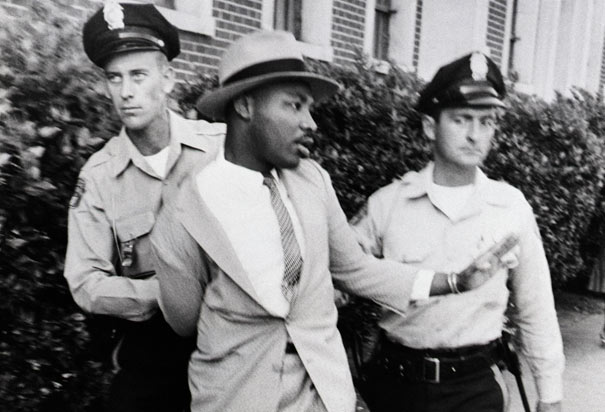Generating facebook buzz is a video played at the Democratic National Convention, headlined by the memorable tag “government is the only thing we all belong to.”
A simple message of civic inclusiveness and unity, desperately needed in an age of individual selfishness and greed? Or a nefarious sign of a lack of subsidiarity, and maybe even worse, a slam on “intermediate communities,” especially the Church (which, of course, is “the only thing we all belong to,” in an eschatological sense, according to Lumen Gentium… and yes, it does mean “all people” in total, as outlined in the discussion of the People of God in paragraphs 13-16)?
First, a caveat: it seems to me that, on Left or Right, we can all try to take the rhetoric of campaign ads with a certain grain of salt, rather than as pure philosophical statements. Paul Ryan is certainly misguided by libertarian economists, but I do not think he is Howard Roark. Similarly, while there is a faction of the Democratic party which is extremely suspicious of “churches” (notice how “different churches and clubs” gets to be the contrast with “government”), I do not think the DNC is secretly telegraphing a fascist takeover of subsidiary organizations in the near future. (Witness the extremely paranoid and absurd comments on the YouTube video) The DNC is trying to counter the overheated anti-government rhetoric of the other party by portraying civic involvement as something noble and valuable.
But we can and should ask about such videos, and perhaps about the spectacles that the conventions are: What are we witnessing, and how should we respond? Videos like this are really nation-state liturgies… but it’s silly to pretend that Republicans do not have nation-state liturgies as well. The Democrats, in the video, want to suggest that the government (and here they explicitly say all levels) is the site where citizens in pluralistic societies figure out how they are going to cooperate with one another in order to help everyone. It’s good because it’s the place where we show that “we are committed to people”… and not just “our” people. That is to say, the video suggests (rightly) that a limitation of subsidiary communities is their tendency toward insularity and parochiality. Government is “good” because it is the place where we have to get beyond these limits, and care in a more universal way. To stereotype a bit, the liturgy of America more commonly portrayed in Republican settings tends to focus more on freedom, family, opportunity and hard work, and military service. Republicans venerate the flag and “America” at least as much as Democrats, but their “America” is imagined differently. (And, of course, its government is not smaller. It allows warrantless wiretapping, expands the military, and bans same-sex marriage by federal law. That is not small government. It’s just different big government.) The story that the two parties are telling is, in a real way, different – even if both stories are stories about belonging. Indeed, in some ways, these liturgies are very much fewstivals of belonging to two differently-imagined Americas.
To put on my Bill Cavanaugh hat, one can see that both parties are taking different bits of the Church’s self-understanding and pasting it onto the nation-state. On the one hand, Republicans cannot help but trumpet American exceptionalism, but more importantly, they tie freedom, prosperity, and peace to America, and in particular, to business and military success. The promises – freedom, prosperity, peace – sound Christian, even if the means do not. On the other hand, Democrats are talking the unity of the human race, particularly in service to those who are in need. Christian-sounding promises indeed! But by what means? “Government”? How does the ACA actually turn into greater civic engagement, instead of a bureaucratic entitlement program? Translating the Obama campaign energy into real civic engagement has been no easy thing to imagine, except in a promotional video.
Right now, Christian discussion of all this tends to be a three-way debate. One side, a side that tends to take up the mantra of “Christian” in the most public way, buys into most of the Republican liturgy. A second side, partly out of conviction, and partly in resistance to the appropriation of “Christian” by the other side, defends the Democratic liturgy. And a third group, influenced not simply by figures like Bill Cavanaugh and Stanley Hauerwas, but by twenty centuries of recognizing how easily Christians get co-opted by the powers of the ruling state, warns both sides to reject these liturgies as idolatrous.
As Catholics, we should recognize three points in our response:
1. There needs to be a recognition that governments (at whatever level) are in fact authentic agents of common responsibility. Or, in Catholic terms, governments are really and truly agents of solidarity. They are necessary is a number of ways, and potentially helpful in a number of others. Catholic social teaching, both medieval and modern, offers some clear guidance on both categories. The magisterial proof-texts here are well-known and numerous. We can’t be Anabaptists on this, nor can we be libertarians.
2. Governments are and always need to be subordinate to the Church as the ultimate agent of human solidarity. Now, I don’t mean “subordinate” in a theocratic way – but in the sense that the ways and means of enacting solidarity should be seen as ordered toward the ultimate trans-national human solidarity Christians hope for in the eschatological gathering. The Church is eschatological in a way the nation-state is not. This has several very important corollaries. It means that we do really like the idea of a “pluralistic” state that widens our solidarity beyond kin. It means that the means we use to enact solidarity should be consistent with, and not contrary to, the Kingdom. (For example, I think this means that solidarity with women cannot mean supporting abortion rights, and solidarity with our military cannot mean supporting unjust wars) Probably more important, it means that we really do believe religion to be something other than a civic “intermediate association.”
3. These general, abstract ideas then need to grapple with how this liturgy is about “America”, and not Canada. Or Sweden. Or Poland. There is a considerably greater danger, because we are Americans, that our solidarity as a nation-state will lack modesty and will be prone to self-deception. This is not a Democratic or Republican problem. It is a problem we face as Americans. Each party enacts this lack of modesty in different ways, and often does so by tacitly ignoring aspects of our national behavior that “offend” the liturgy. We are the richest, most militarized, most consumptive nation on Earth, and we are also a nation whose founding remained wrapped in an eschatological exceptionalism. As a nation, we remain unusually violent, sexually unfaithful, and greedy, especially in light of our great shared wealth, our enormous natural resource base, and our safety from any kind of war and strife. Have we really learned peace, fidelity, and sharing, as the Gospel solidarity teaches? We fall short hopelessly. This should not mean that we abandon point #1. It does mean that, as Americans, we should be extra-careful that our national solidarity does not become a deception.
Can these three points serve as a common base for discussions about particular aspects of the role of government? I’d like to think so.




